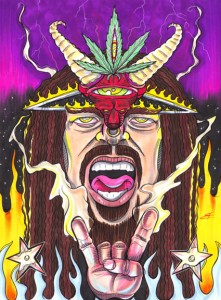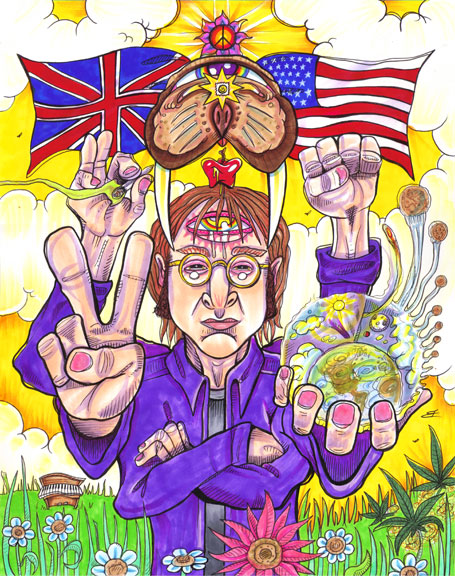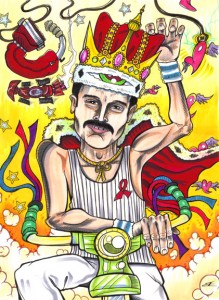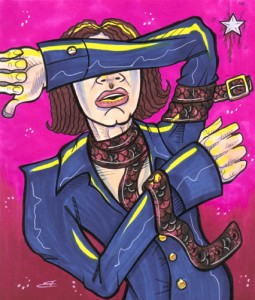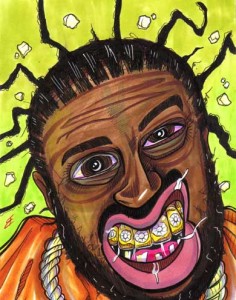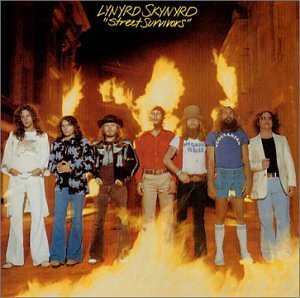Pantera’s furious music was propelled by guitarist Darrell Abbott’s maniacal claws ripping across a Washburn fretboard. The music was aggression distilled, warfare on vinyl, the hellish harmonics of testosterone-pumped teenagers smashing beer bottles and crucifixes, the pentatonic expression of sociopathic sexual impulse turned loose on loose pussy, power chords and possession, amplifiers and alcohol, whammy bars and whimsical youth. Pantera was pissed. And yet, no one remembers the jolly Dimebag Darrell being particularly pissed in day-to-day life. Not nearly as pissed as John Lennon was, anyway.
Behind the lead Beatle’s circular granny glasses and tireless promotion of peace burned a fury unmatched by most metal enthusiasts. Lennon was pissed at his parents, pissed at his bandmates, pissed at his stay-at-home wife, pissed at Her Majesty the Queen, pissed at America’s war machine, pissed at the world for not giving peace a chance. Lennon was fucking hostile. But neither Dimebag nor Lennon were as pissed as the two pistol-wielding schizophrenics who made them into rock star martyrs, both on December 8, twenty-four years apart.
To be fair, John Lennon’s youth in England was marred by parental abandonment and random death. His sea-faring father left John in 1946 when he was only five, and his eccentric mother, Julia, left her son in care of his aunt Mimi in a house full of women. His mother eventually came back into John’s life a few years later—even buying him his first guitar—only to be run over and killed by an off-duty cop one sunny afternoon when John was only seventeen.
John took his personal pain and pissed disposition to the Liverpool College of Art, where he met the straight-laced Cynthia Powell, who would become his wife, and became best friends with the brilliant painter Stuart Suttcliffe, who for a brief time would become the musically incompetent fifth Beatle during their formative residencies in Hamburg, Germany.
In January of 1962, the Beatles signed a contract with their new manager, Brian Epstein, a closet homosexual Hebrew who immediately fell in love with the young John Lennon. Epstein’s savvy negotiations would see the barely-known Beatles become the biggest band in the world within two years, and that astonishing success would see Epstein become, in Lennon’s playful words, a “rich Jew fag.” Everybody wins until somebody dies.
The Beatles returned to Hamburg in April of that year, where they were to visit Stuart and his new wife. They were greeted with the news that Suttcliffe was dead. Coroners had found a brain tumor below an indentation in his skull—perhaps inflicted when a group of thugs attacked Stuart in a pub, or else by John when he kicked Stu’s head into the pavement for leaving the band. John fell into a somber silence for days, finally pulling it together to console Suttcliffe’s widow, and then resume his raucous rock star ambitions.
In July, Lennon learned that Cynthia Powell was pregnant. Rather than getting pissed and knocking her around, as he would do during jealous rages—or paying a £200 settlement for her silence, as Epstein had done for numerous others—John asked Cynthia to marry him. Their son Julian was born in April the next year, two days shy of Sutcliffe’s deathday. Family life is usually a total cock-stopper for hard rockers, but unlike many aspiring musicians, becoming a father never stifled Lennon’s rise to ultra-mega-super-stardom. It didn’t slow his groupie-scrogging, either.
That year, 1963, Beatlemania engulfed the UK on the heels of Twist and Shout. These dazzling English chaps with their shaggy mops and spiffy gentleman’s suits rode to the top of the world on a wave of squealing pubescent girls. Twenty years later, Dimebag Darrell (then known as “Diamond” Darrell) would launch what would become the biggest, most aggressive mainstream metal band in the world. Of course, in those days the glammed-out members of Pantera dressed like, well, squealing pubescent girls.
✝✝✝
By all accounts, Darrell Abbott and his brother Vinnie Paul enjoyed a remarkably stable childhood growing up in a working class neighborhood near Arlington, TX. Their father Jerry was a musician, and fervently cultivated his sons’ ambitions to become rock stars. Their mother was no less nurturing, working hard at a factory to support her jobless boys’ hobbies. By this point in history, rock n’ roll was just another pastime.
Darrell spent countless hours alone in his room practicing guitar licks while Vinnie hammered away on his drum set. Unlike many disturbed metal fans, the boys didn’t immerse themselves in hard music to escape from the irritating world outside so much as escape into the powerful fantasy worlds of heavy metal. While other boys went to school, played sports, partied, got laid, got jobs, and all that normal shit, the Abbott brothers continued to rock out at their parents’ house well after most kids had gone off to college and started careers.
Darrell prostrated himself before the guitar gods of his youth until the day he died. He gauged his musical progress by phlegm accumulation—while playing a particularly difficult lick, he would arch back and hock some nostril sauce over his shoulder onto his infamous “loogie wall.” Each thick splat signified another riff under his belt. Listening to the exquisite dynamic between Eddie and Alex Van Halen, the Abbott brothers wouldn’t be satisfied until they became Van Halen.
Pantera’s first six albums were recorded at Jerry Abbott’s studio near the boys’ home. Their father actually created a label for their first releases. Pantera’s early efforts were a dripping cheese sandwich on toasted metal: Metal Magic, Projects in the Jungle, I Am the Night, and finally, Power Metal, which was written by their original singer—who was a pussy—and recorded with their newfound singer, Phil Anselmo—who was pissed. Once Phil showed up, Pantera became what they were always meant to be: cowboys from hell.
Dimebag’s blistering riffs and Phil’s endless anger—at cops, Christ, corporate trendies, and the various cock-nozzles life will throw at you—propelled Pantera to the heights of Headbanger’s Ball and around the planet on multiple world tours. But it didn’t matter where Dimebag found himself—the world was his wet bar, every new face was a new best friend, and each concert was a hysterical joke for which a smashed guitar was the punchline. Darrell rarely found time to be truly pissed. Life was entirely too fun for actual fury.
✝✝✝
John Lennon prostrated himself before many gurus during his life, in his own swaggering manner. Through absorption, projection, and continual metamorphosis, he became the most iconic guru of the revolutionary generation. Lennon became a hero wherever a hero was needed most.
The first waves of Beatlemania saw John Lennon: Sex Icon. He had watched Elvis get all shook up, and now it was his turn. One glance could unleash a spastic spontaneous orgasm—or at least, so it seems from the grainy footage. The Beatles were like sweat-soaked vibrators buzzing across the world. The teeny-boppers lined up in droves, panting, weeping, screaming, fainting, falling all over themselves to get just one inch closer to the sly, if agonized Lennon. Of course, pretty boy Paul McCartney got the lion’s share of adoration, and for the competitive Lennon that would never do.
Fortunately, no other Beatle had the nerve to touch his role as John Lennon: Rebel Icon. Sensible, traditional, down home decent folk balked at his observation that “Christianity will go. It will vanish and shrink…We’re more popular than Jesus now. I don’t know which will go first—rock n’ roll or Christianity.” Inflammatory statements like that ensured that kids would love him and parents would hate him, even if they wound up buying their kids more Beatles albums.
After turning off his mind in the mid-Sixties, he became John Lennon: Psychedelic Icon. Inspired by Timothy Leary’s enthusiastic writings and bombarded with a continuous supply of LSD, Lennon began dosing on a daily basis. The first few times were freak outs, but once he got the hang of it, tripping became his fast-track to enlightenment. The Beatles’ music shifted into another dimension. Revolver and Sgt. Pepper’s Lonely Hearts Club became psychedelic staples. “Tomorrow Never Knows” and a sugar cube might take you across the universe. It wasn’t long before Lennon got burnt out on chemical mind expansion, though, and set out looking for a heavier trip.
The Maharishi Mahesh Yogi was a creepy little gnome, but his Transcendental Meditation cult briefly captivated the Beatles in 1967, and inspired the development of John Lennon: Spiritual Icon. This short period of navel-gazing and chanting the sacred Om was to be an eerily pivotal moment in the singer’s life. After years of abuse and alienation from John’s life of stardom, his wife Cynthia made the decision to leave John after she was pushed back by a security guard while trying to board a train for the Maharishi’s retreat in Wales. The Beatles went on without her. Lennon’s manager Brian Epstein was wary of the devious guru’s exploitation of his clients’ fame, but Epstein died of a drug overdose while the band was meditating at the retreat, so that was that. “Now you will be able to come to India with me,” the Maharishi told them, which they did. Lennon didn’t last long in India, though, what with all the mindless conformity, bland food, and accusations that the Maharishi had sexually assaulted Lennon’s fellow aspirant, actress Mia Farrow. When the guru asked why he was leaving, Lennon replied, “If you’re so cosmic, you should know.” Lennon’s spiritual quest would not end there, however, as he would soon find himself kneeling at the Goddess’ feet.
John met Yoko Ono at one of her art shows at the same Indica bookshop where he had discovered Timothy Leary’s manual The Psychedelic Experience. He later said that lightning struck immediately, creating John Lennon: Pussy-whipped Icon. After a bizarre courtship in which the witchy Yoko basically stalked Lennon at his home and wedged herself between him and his already estranged wife, the two finally consummated their love. The day before, Lennon had held a meeting with the Beatles and core members of the Apple Corps, where he proclaimed with no hint of humor, “I’ve got something very important to tell you all. I am Jesus Christ come back again. This is my thing.” Yoko became his Mary Magdalene with which he could work on half-baked conceptual art projects, record bizarre noises that barely resemble music, release album covers and photo shoots displaying their fig-leafless flabby asses, abandon his band, his family, and his manhood, and of course, do up massive amounts of heroin.
By the end of 1969, Woodstock had made people believe in the power of music to create peace, Charles Manson had been inspired by The White Album to slaughter of Sharon Tate and friends to start the race war, Altamont had called all possibility of peace into question, the draft had been reinstated for the Vietnam War, and the Beatles had called it quits with extreme animosity, after less than a decade together.
With his leftist lover now permanently attached, he became John Lennon: Revolutionary Icon. The couple moved to New York and met with the Yippies to lend a hand in stirring up the shit. They wore bags during interviews to subvert the prejudices associated with race, beauty, and of all things, hair length. After marrying, they held a highly publicized “Bed In” as an eccentric “commercial for peace.” John took Yoko’s last name, becoming John Oko Lennon, and began calling his wife “Mother.” He wrote cynical songs about working class heroes, hopeful songs imagining no religion, countries, or possessions, provocative songs about women being the niggers of the world, doubtful songs about not believing in Hitler, Jesus, Kennedy, Kings, or Elvis, desperate songs asking people to just give peace a chance.
They projected the image of perfect soul mates, inspiring people who had given up on love to open their hearts. But in 1973, John took some time off from the marriage. He moved out of the house, got wasted every night, and perhaps most importantly, he started banging his twenty-two year-old personal assistant, the petite Asian May Pang—all at Yoko’s insistence. After a year and a half of belated bachelorhood, he crawled back to Yoko with his tail tucked between his legs. In 1975, Yoko gave birth to Sean. They both retired from public life to raise their son, and the new father settled into John Lennon: Family Man Icon for the last five years of his life.
Three weeks after the release of their comeback album, Double Fantasy, John Lennon signed a copy for a disgruntled fan waiting outside the Dakota apartment building in New York. A few hours later, that same fan shot him dead. The signed copy is presently on sale for nearly one million dollars.
✝✝✝
Dimebag Darrell’s story isn’t nearly as complicated or convoluted. The details of his life are scant compared to someone like Lennon, whose every burp and fart was documented and filed away, but by all appearances, life was really quite simple for Dimebag. He celebrated Halloween like it was New Year’s Eve, and approached life like every day was Halloween. Special occasions called for a drink, and every moment was a special occasion. If you were invited, you had to drink, most likely a black tooth grin (two shots of whiskey and a splash of cola.) And it didn’t matter who you were, everyone was invited.
If he didn’t have a guitar in his hand, Dimebag had a drink or a bottle rocket ready to blast it in your face. He was a tireless prankster. If he caught you asleep, you were canvas. If you were looking the other way, you were a target. If you took yourself too seriously, like the time he stumbled across tedious guitar god Yngwie Malmsteen at a hotel and had his roadie accost him with a bag of donuts (“No, I don’t like donuts! I don’t like donuts!”), you were a piece of performance art for his home video collection. One of his posse’s finest productions was short skit in which a roadie gets his hand smashed off by a road case and stolen by a random passerby. Had he not been so engrossed in music, Dimebag may have been an America’s Funniest Home Videos contender.
First and foremost was family. Dimebag was fiercely dedicated to his brother, Vinnie Paul. When Dave Mustaine left Metallica, he offered Dimebag the spot as lead guitarist in Megadeth. Darrell agreed, on the condition that his brother would be the new drummer. But Megadeth already had a drummer, and Dimebag had better songs to write, anyway.
Whenever Darrell came home to Texas from touring, the first thing he did was have a drink. The next thing he did was visit his mother and pay off her credit cards. Even after he had earned a small fortune, Dimebag’s home was never more than a few miles away from the house he grew up in, which was just a few miles from his father’s recording studio. Pantera’s first six albums were recorded with his father, and the seventh, Far Beyond Driven, was recorded with another producer at their father’s new studio in Nashville, TN. Dimebag never tired of familiar places. His love life was no exception.
Darrell met Rita Haney at the age of eight when she kicked him off of his bicycle. They remained friends until they were teenagers, when he made his first move. They never looked back from that kiss, and were joined in common law marriage until the day he died. By all accounts, Rita never slowed Dimebag down. At the very least, she never asked him to wear a fucking bag during interviews. If Dime wasn’t partying at home or playing onstage, he was doing both at a strip club. How many women Dimebag slept with is not a matter of public record—it could have been one, it could have been one thousand. Considering the typical road rules of the rock star fraternity, one is inclined to believe the latter. A gentleman does not kiss and tell, but it’s doubtful that Rita would care if he did either.
When the band settled into their final four-piece—Phil, Dimebag, Vinnie, and Rex—they shed their girly outfits for regular street clothes. Pantera’s true debut was Cowboys from Hell in 1990, and it blew up like a car bomb. Vulgar Display of Power had twice the blast radius, and 1994′s Far Beyond Driven remains the most aggressive album to ever chart at #1. Any pissed off kid who didn’t want to be pissed alone gathered around Pantera. Their message was blood simple: Fight for your friends and fuck up your enemies.
Phil Anselmo wrote all of the lyrics, but of course, Dimebag sang along to every song. The message flowed through him. Phil was an archetypal warrior male, furious at the world. His words aimed the machine gun and Dimebag fed him the gain-heavy ammunition. Fuck your parents, fuck your girlfriend, fuck the cops, fuck their government, fuck the Christians, and on a bad day, fuck the Christ they stood for. Pantera’s sound was as provincial as Dimebag’s drawling Texas accent, as Southern as the Confederate flag on his custom Washburn, as damaging as the black tooth grins soaking into his liver. Funny thing is, Dimebag never stopped smiling. Everything was a laugh.
While the trials must have been many, Dimebag’s biographies only describe three traumatic experiences in his life. The first was the death of his mother, who succumbed to cancer in 1999. The second came after 9/11, which left Pantera stranded in Ireland for two weeks. Phil had been struggling with heroin addiction for years, exacerbated by degenerating discs in his spine. The tension was mounting over his erratic behavior. When the band arrived back in the States, they went their separate ways but never came back together. In 2003, they finally announced the break up of Pantera. The Abbott brothers had become the “enemy” that Phil was so intent on fucking.
So far as Dimebag was concerned, Pantera and their road crew were family, thick as blood. Nothing could hurt him like the dissolution of his tribe. The Abbotts formed a new band, Damageplan, but had fallen from playing packed arenas to filling small clubs. “The highs and lows of rock n’ roll,” was all the bitching Dimebag would indulge. To make matters worse, a war of words continued in the press between Anselmo and the Abbotts.
In December of 2004, Metal Hammer published an ominous interview with Phil Anselmo in which he unleashed his fury:
“[W]hat comes around obviously goes around, and that is definitely something that is a very powerful force in my life…Cycles on top of cycles. Revenge on top of revenge. I suggest no one do me wrong…Things don’t go so well for them…And I lift not a finger…”
When the subject moved on to the Abbotts, Phil said:
“[Dimebag] would attack me vocally, and just knowing that he was so much smaller than me, I could kill him like a fucking piece of vapor…He knows that and the world should know that and so, physically of course, he deserves to be beaten severely…
“I was…a unique, unbelievably magnetic front man…I have a devoted following that would do anything for me, anything that I say.”
One week later, a crazed fan jumped onstage and gunned Dimebag Darrell down as well as a body guard, a stagehand, and a fan, before being shot by Officer James Niggemeyer. Talk about unfortunate timing.
✝✝✝
Happiness is a warm gun. So heavy in the hand. So easy to pull the trigger. One flick of the finger makes a tiny hole. God-like power. Any idiot can do it.
Nathan Miles Gale grew up in small town Ohio. He was batshit crazy, and pissed as all hell. He believed that Mike Judge was watching his every move, basing Beavis and Butthead off of his pathetic life. He also believed that the guys in Pantera were up to the same tricks. He listened to their music so much that the songs became his own. They were stealing his lyrics for their songs. Why wouldn’t anyone else understand that?
He saw menacing faces hovering above his bed at night. Their voices taunted him, called him a homosexual, told him to hurt people.
Nathan enjoyed drugs. He smoked dope, dropped acid, ate pills, snorted coke. When the Twin Towers fell on 9/11, Nathan was alone in thinking that Marilyn Manson was behind the attacks. He joined the Marines at nineteen, but was discharged when it was learned he was schizophrenic. He moved into an apartment next to his mother. In December of 2002 she bought him a 9mm Beretta. Two years later, he took it to a Damageplan concert at Alrosa Villa in Columbus, Ohio to find Dimebag Darrell and settle the score.
Mark David Chapman was born in Texas, but went to school in Georgia outside of Atlanta. He traveled the world from there. He also smoked dope, dropped acid, ate pills, snorted coke, and became a born again Christian. He was also batshit crazy, a god in his own mind, ruling over the voices which he called the Little People.
After cheating on his fiance, he decided to go to Hawaii where he would kill himself. He was committed to a mental facility there, but was so liked that he was hired on part time after his release. He eventually married a Japanese-American woman, just like John Lennon. He listened to Lennon’s music obsessively, just as he read The Catcher in the Rye. After reading a book about Lennon’s lavish lifestyle in New York, he was extremely pissed. He was indignant that Lennon would arrogantly disavow Jesus. And how could John Lennon: Revolutionary Icon tell people to imagine no possessions and yet live as a millionaire? He told the Little People that he would kill John Lennon. They begged him not to, but his mind was made up. The Little People fell silent.
After two previous attempts were aborted in last minute panic, Chapman arrived in New York on December 6, 1980. The last thing he did before finding John Lennon was buy yet another copy of The Catcher in the Rye, in which he would write: “This is my statement” signed—Holden Caulfield. He left the book in his hotel room, but brought a copy of Double Fantasy and a loaded .38 with him.
By demons be driven.
✝✝✝
John Lennon gave his final print interview to Rolling Stone the day Mark David Chapman arrived in New York, but it was never published until thirty years after his death, one year ago. Many people claim that Lennon had shown foreknowledge of his death, and this interview shows an eerie prescience that makes one wonder if Yoko’s nutty New Age ideas of cosmic connections were really that far-fetched, though it raises a number of questions about the couple’s belief that projecting one’s thoughts and intentions can create one’s reality.
“They only like people when they’re on the way up,” Lennon told Jonathan Cott, “and when they’re up there, they’ve got nothing else to do but shit on them. I cannot be on the way up again. What they want is dead heroes, like Sid Vicious and James Dean. I’m not interested in being a dead fucking hero….So forget ‘em, forget ‘em.”
© 2011 Joseph Allen
John Lennon — “Woman is the Nigger of the World”
1972
Pantera — “This Love”
2000
